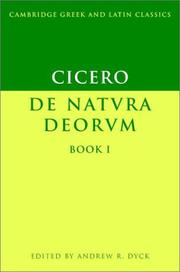| Listing 1 - 1 of 1 |
Sort by
|

ISBN: 0521006309 0521803608 0521803601 9780521803601 9780521006309 9780511803628 0511803621 Year: 2003 Volume: *12 Publisher: Cambridge: Cambridge university press,
Abstract | Keywords | Export | Availability | Bookmark
 Loading...
Loading...Choose an application
- Reference Manager
- EndNote
- RefWorks (Direct export to RefWorks)
Book 1 of De Natura Deorum exhibits in a nutshell Cicero's philosophical method, with the prior part stating the case for Epicurean theology, the latter (rather longer) part refuting it. Thus the reader observes Cicero at work in both constructive and skeptical modes as well as his art of characterizing speakers. Prefaced to the Book is Cicero's most elaborate justification of his philosophical writing. The Book thus makes an ideal starting point for the study of Cicero's philosophica or indeed of any philosophical writing in Latin, since it delineates the problems such a project raised in the minds of Roman readers and shows how Cicero thought they could be met. There is also a systematic and detailed doxography of ancient views about the deity, an important document in itself, presented from an Epicurean perspective. The volume's Introduction situates this text within Cicero's intellectual development and ancient reflection about the gods.
Gods, Roman --- Theology --- Dieux romains --- Théologie --- Early works to 1800. --- Ouvrages avant 1800 --- Cicero, Marcus Tullius --- Cicero, Marcus Tullius, --- Cicero, Marcus Tullius. --- Théologie --- Gods [Roman ] --- Early works to 1800 --- Gods [Greek ] --- Religion --- Gods, Roman. --- Philosophy --- Philosophy. --- Discursos latinos --- Oratoria antigua. --- Retórica antigua. --- Historia y crítica. --- Cicerón, Quinto Tulio, --- Crítica e interpretación. --- Arts and Humanities --- History --- Gods, Roman - Early works to 1800. --- Theology - Early works to 1800 --- Cicero, Marcus Tullius, - 106 B.C.-43 B.C.. - De natura deorum. --- Religion, Primitive --- Atheism --- Irreligion --- Religions --- Cicero, Marcus Tullius, 106 B.C.-43 B.C.
| Listing 1 - 1 of 1 |
Sort by
|

 Search
Search Feedback
Feedback About UniCat
About UniCat  Help
Help News
News